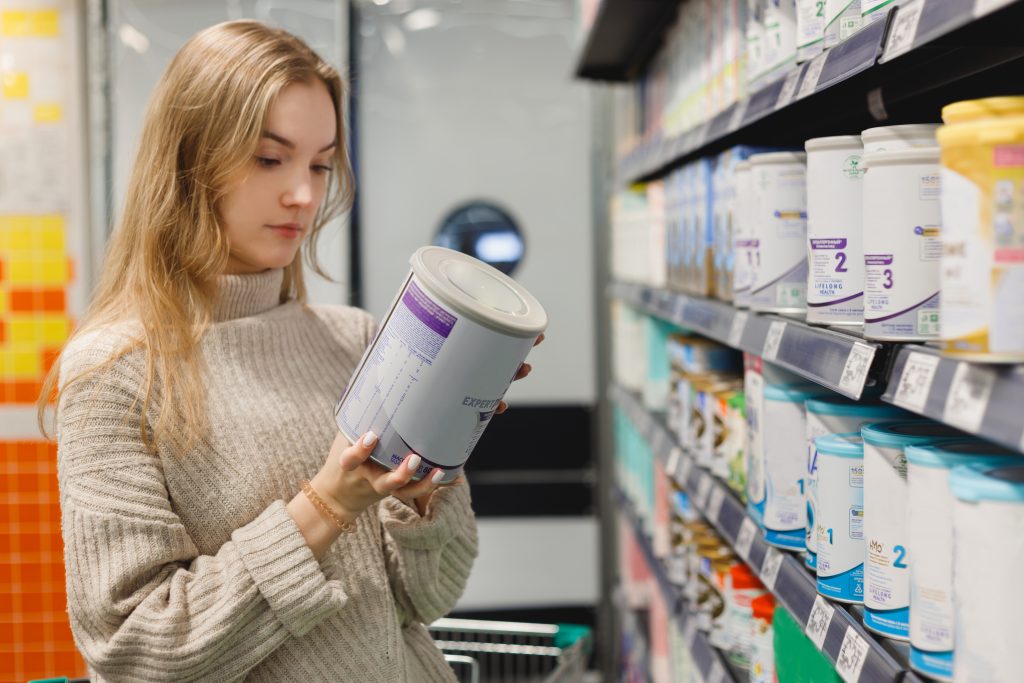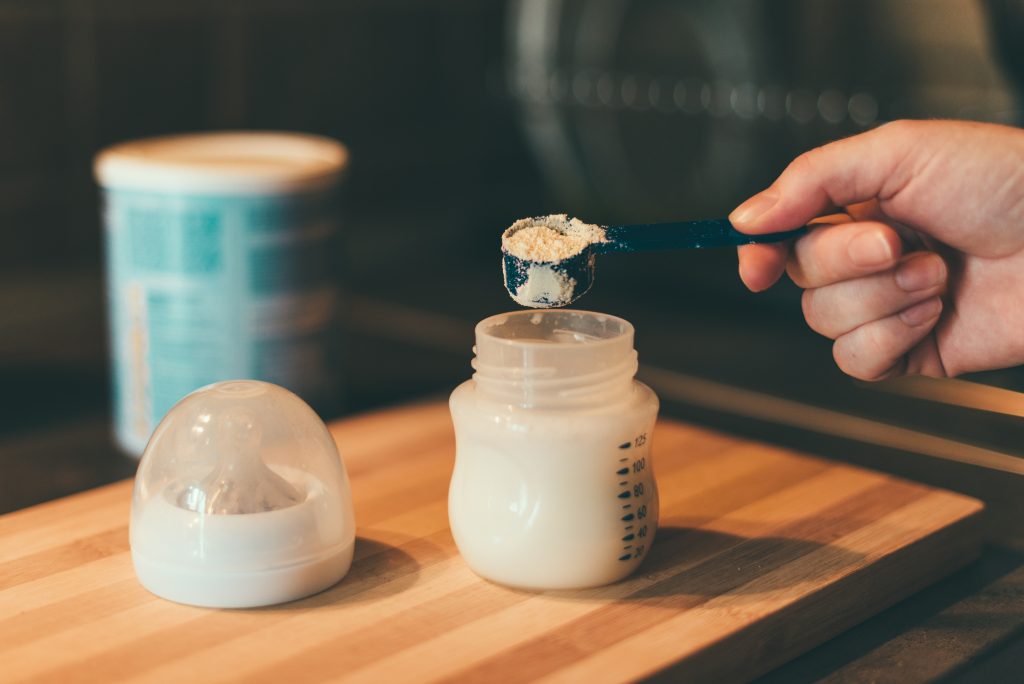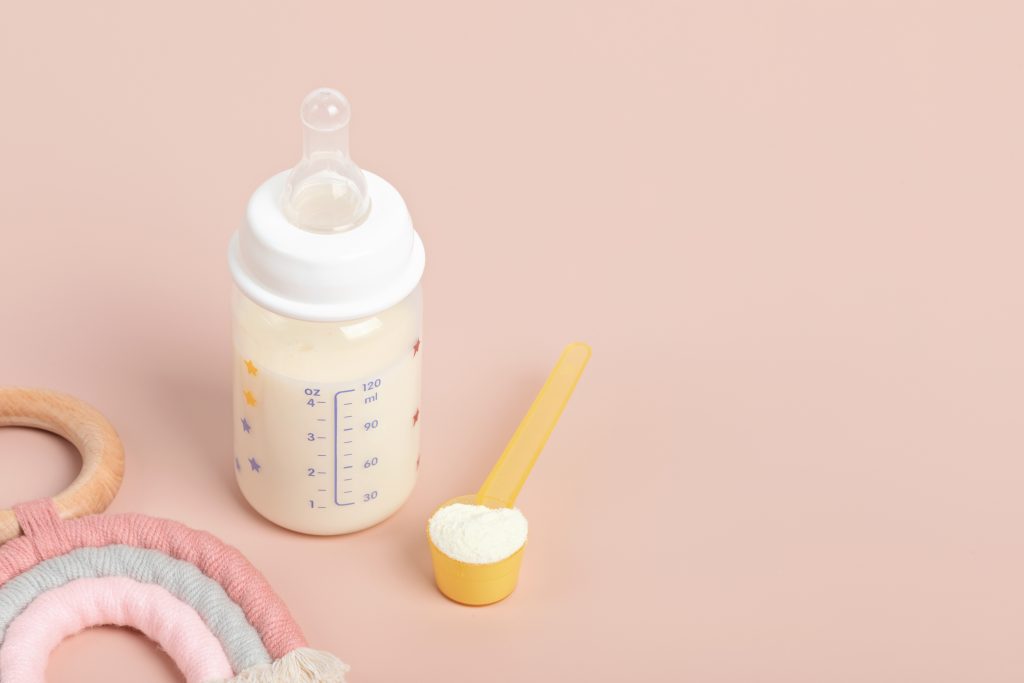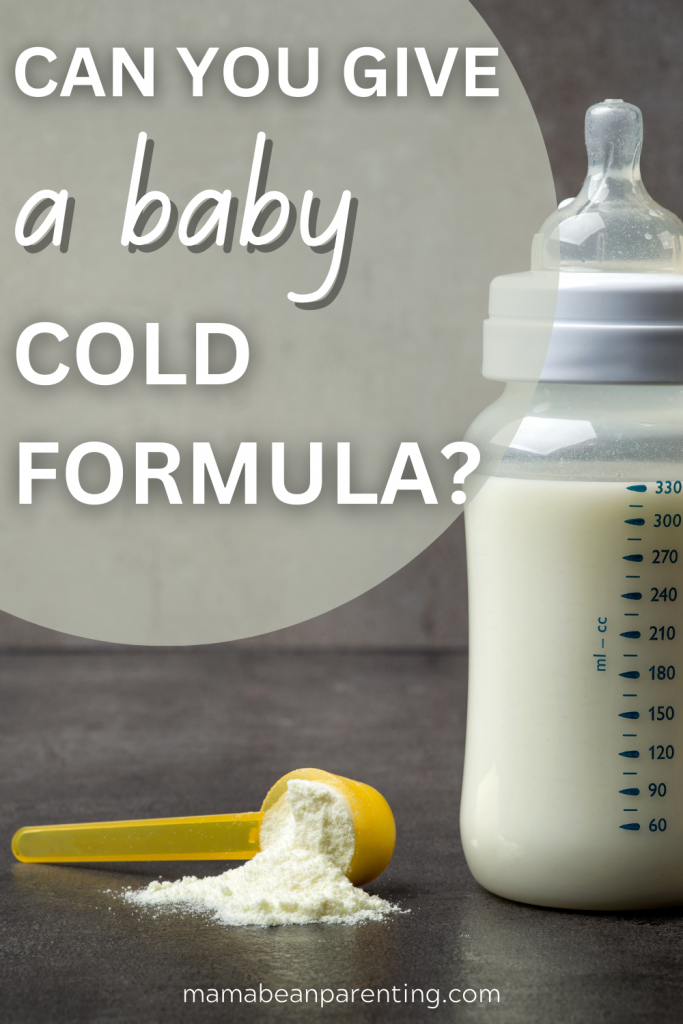Giving your baby a cold formula is perfectly fine.
Of course, I understand you want to know more about this topic, so I will tell you more about it in this article.
Almost every new mom prefers to breastfeed her child to create that amazing first contact. Unfortunately, sometimes breastfeeding is not an option. There are many possible reasons for not being able to breastfeed, but no matter what the reason is, you should not feel bad.
Breastfeeding is natural, but if it’s not working for you, then the baby formula is great. It exists for a reason. It’s there to feed your baby with great nutrients. Many women feel that feeding their baby with baby formula is more difficult, and that is definitely true.
When you’re breastfeeding, there aren’t any special preparations for nursing. However, if you’re feeding your baby with baby formula, there are some things that have to be done before the feeding.
Additionally, there are always certain questions about the baby formula. Can you give a baby cold formula, which brand is the best, how to store baby formula, which bottle is the best, etc.
This article will help you to get all the answers. As a new mom, sometimes it’s confusing to memorize everything, but you know you have to do it. With time, all of these things will seem simple to you.
When they do become simple, some other issues come, and that is the circle of life. For now, focus on your baby’s growth and development.
What Is A Baby Formula?

Baby formula is a special food for infants and babies that serves as a replacement for breast milk. In most cases, you can use the bottle to feed your baby with the formula. Some moms use cups if their baby is older and doesn’t like bottles.
There are a few kinds of baby formula. You can buy the powder formula and mix it with water. There are also concentrated, liquid formulas that sometimes require additional water. And there are ready-to-use baby formulas.
It’s up to you which one will you choose. However, it’s possible that your baby doesn’t like certain baby formulas. Maybe your baby doesn’t want to drink it. Perhaps it doesn’t do anything for your baby’s growth.
Some formulas and some babies aren’t made for each other. That doesn’t mean there is something wrong with the formula. It just means that you have to find another one for your baby.
Some moms have a hard time finding the right one, and some moms find it right away. This is something individual, and you should not feel stressed about it.
Since baby formula should be a replacement for breast milk, it has to contain all the recommended nutrients. Some of the formulas on the market contain the bare minimum of these nutrients, and some of them are enriched with nutrients and other beneficial ingredients.
Therefore, it’s a good idea to explore the ingredients and look for baby formulas that are high quality and nutritional. You could also purchase an organic formula.
There are a few types of baby formula you can purchase:
–Formulas based on cow milk protein or goat milk protein (Holle goat milk formula)
–Formulas based on soy protein
–Protein hydrolysate formulas (for babies who have protein allergy)
You will also notice that there are plenty of fortified baby formulas, and you should definitely look into them. Bay formula fortified with iron is a must-have.
Additionally, there are some other enhanced baby formulas that can be bought. Those formulas contain additional ingredients like omega-3 and omega-6 fatty acids.
Some studies have shown that using enhanced baby formula is better for a baby’s growth and development. Be careful when buying these types of formulas, and consult with your doctor.
Another thing to be careful of is the date on the packaging. Always check the date since you can’t use outdated baby formula. There are also some other types of baby milk formula. You will find infant formula, stage 1 formula, stage 2 formula, and stage 3 formula.
Infant baby formula and stage 1 formula are used for newborn babies and babies younger than six months. Stage 2 formula is used for babies aged six months and older. Stage 1 and stage 2 milk formulas are most likely to be found in every store.
Stage 3 milk formula is used for babies older than ten months. You will also find a stage 4 formula that is pretty much the same as regular milk.
Preparing Baby Formula
Preparing a formula for your little one is not complicated, but there are a few important things to remember.
Before starting with the formula, you have to make sure that the working area is clean. So, wipe that kitchen counter and pat it dry. After that, wash your hand thoroughly with soap and water. Then, dry your hands and get to work.
Having clean hands and a clean surface to work on is essential. Your baby is sensitive and even the most common bacteria can be harmful.
After this first step, it’s time for some more cleaning. It’s time to wash and sterilize the baby’s bottle, nipple, rings, and caps. Sterilizing can be done by boiling these things in the water.
However, you can also purchase a microwave steam sterilizer bag or an electric steam sterilizer. There are many products that can make this step easier.
Sterilizing the bottle is not something that has to be done every single time. It is a must when you’re using a bottle for the first time. After the first time, you can wash it with hot water and soap and occasionally sterilize it.
If your child has some health issues, then it’s better to stick to sterilizing every time. You don’t want to risk anything in this case.
It’s time to mix the water and the formula. Make sure to follow the instructions. Making a baby formula that’s too dense or watery is not good. If it’s too dense, your baby could become dehydrated. If it’s too watery, you’re not giving your baby all the nutrients needed.
You can use tapped or bottled water, cold or warm water. Just make sure it’s clean and safe to use. If you’re not sure, boil the water before mixing it with the formula.
If you mix the formula with the cold water, you can always warm it up using a bottle warmer or something else. It’s not essential to have a bottle warmer, so don’t worry about that.
Another important thing is storing the formula correctly. If you prepare more formula than you need, label it, and don’t refrigerate it for more than 24 hours.
If you think that all of this is too much work, you can always go for ready-to-use formulas. They are convenient and safe, but they are more expensive. So it’s your choice which type of formula you’ll use.
Can You Give A Baby Cold Formula?

As I’ve mentioned before, you can give your baby cold formula. It’s safe, and some babies like to drink cold milk formula. This is very useful, especially if you prepare more bottles and leave them in the refrigerator.
You can take them out and give them to your baby. However, I do recommend checking how cold it is. A formula that is too cold could upset your baby’s stomach, and it could make their body burn more calories.
So, if it’s too cold, leave it at room temperature for some time, or run it under warm water. Sometimes a cold bottle is a problem, not cold milk. This can also be solved with some warm water, or by keeping the bottle at room temperature.
Some babies enjoy drinking a cold formula when they’re teething. A cold formula helps soothe their gums and inflammation.
Drinking warm or cold formula is up to your baby. You can try switching it up to see which temperature is the best for your baby. The best scenario would be if your baby liked both warm and cold formulas.
That way, you won’t have any problems with feeding your baby no matter where you are and what time it is.
As you can see, some babies drink cold milk and prefer the cold bottle and some babies drink warm milk and enjoy the warming sensation. You have to experiment and see what happens and how your baby responds.
At the end of the day, the most important thing is to feed the baby. Don’t complicate it and listen to your instinct. Parents are often worried for no reason.
Cold Formula For Premature Babies
According to some studies, giving a cold baby formula is not recommended for premature babies. Their body weight is lower and their body temperature is often compromised.
Giving them a cold milk formula to drink can lower that temperature which is not good. If you have a premature baby, make sure to prepare a warm milk formula. Warmness will help them recover faster.
Baby Doesn’t Want A Formula

Some babies have a hard time accepting bottle feeding and formula. It’s hard enough to accept that you can’t breastfeed your child. This situation is difficult, and you probably don’t know what to do.
You only know that you have to feed your child as soon as possible. In this case, relax and wait a while. Your baby will get hungry and he or she will accept the bottle eventually.
However, there are some other possible problems with bottle/formula feeding. A lot of babies have problems with spitting up, constipation, gas, and fussiness. Sometimes the solution to this is changing the baby milk formula, but sometimes you have to take care of some other things.
If your baby is spitting up while being fed, try to change the position. Sometimes the baby’s position is uncomfortable and causes spitting up. Another thing to do is to make sure that you have a good bottle with a good nipple flow.
Some bottles have nipples that make the formula go too fast or too slowly. Try a different bottle or a different bottle nipple to reduce spitting up. Another method that could stop the spitting up is regular burping. Maybe you need to burp your child more frequently.
Finally, a reason behind spitting up could also be a medical condition called gastroesophageal reflux – GERD. If your baby is spitting up or has a lot of cramps and pain in the stomach area, you need to see a doctor.
This condition is nothing to worry about as long as you visit the doctor as soon as possible.
Besides spitting up, it’s possible that your baby is vomiting the formula. This is more serious than spitting up. Sometimes babies vomit because they eat too much.
However, if you’re using baby formula, you have to make sure that you’re making it the right way. Be careful when measuring water and formula to avoid vomiting.
Another reason for vomiting could be an allergic reaction. This is not common, but it is possible. Maybe your child is allergic to a certain ingredient inside the formula. Visit your baby’s doctor to confirm, and get another baby formula that doesn’t contain that ingredient.
Sometimes, the formula is not the cause of vomiting. Sometimes your baby is just sick. That’s why it’s always important to consult with the doctor.
If your baby is gassy, there are a few reasons that could be causing this. The most common reason is getting too much air from the bottle. This is another reason to be careful when choosing a good bottle with a good nipple.
Another reason for a gassy baby is an incorrect feeding position. Make sure to ask your doctor about regular nursing positions to relieve your baby from gas.
A baby that’s not burped often enough can also have a problem with gas and stomach ache. Also, the constipated baby is gassy.
So, try to help your baby by burping him or her. Consult a doctor to get rid of constipation. Don’t worry. There is always a solution. A good tummy massage is always welcome in these cases.
Even if your baby is not vomiting, there may be a mild allergic reaction to a certain ingredient in the formula that is causing the gasses.
There are many other things that could create difficulties when feeding your baby with formula. The point is, you can solve those problems. Don’t worry, and focus on finding the solution.
You can always ask a doctor or a professional to help you with choosing the right bottle, the right feeding position, and the right baby formula. Feeding a baby with formula is a difficult task in the beginning, but if your baby is fine, healthy, and growing, don’t worry.
Conclusion

When you have to feed your baby with a formula, there are many things to consider. The beginning is always difficult. However, even if you were breastfeeding, the beginning would still be hard and complicated.
That’s the thing with babies. There is always something that seems impossible and complicated. The point is, you will learn everything with time.
There are many baby milk formulas available, and it can be difficult to choose the right one. That is actually good. If your baby doesn’t respond well to one of them, you can always buy a different one.
Giving your baby a cold formula is perfectly safe, with some exceptions I’ve mentioned in this article. It’s okay to experiment in order to make your life easier. Besides, it’s possible that your baby likes to drink cold milk, which is a win-win. The baby likes it, and it’s more convenient for you to prepare the formula.
New parents are faced with many challenges. They seem small, simple, and unimportant, but they mean the world. Right now, there is nothing greater than feeding your child and giving him or her everything they need. As always, doctors are your friends, and it’s okay to ask them everything you want to know.
The fact that you’re worried enough to search for this information means that you’re a loving parent to your child. Enjoy these moments because time flies.
In a few months, you will be worried about something else. You will search for information that has nothing to do with cold baby formula. That’s the magic of parenting. Every day is different, and our children grow up so fast.
Hi all, I am Sidney, an accountant, a hobbyist photographer, and a mother to two sweet girls who are my motivation. I love sharing the tips and tricks I gained all these years I’ve been a mother. I hope it will help you!



Feeding Aversion: All You Need to Know • Mama Bean Parenting
Tuesday 18th of April 2023
[…] strategy that may yield favorable results when dealing with a feeding aversion is trying different formula temperatures. But, this does take a bit of […]
How Much Is A Scoop Of Formula? • Mama Bean Parenting
Monday 17th of April 2023
[…] is pretty much it. I would also like to mention that giving your baby cold formula is more than […]